|
|
|
Sort Order |
|
|
|
Items / Page
|
|
|
|
|
|
|
| Srl | Item |
| 1 |
ID:
161538
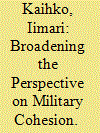

|
|
|
|
|
| Summary/Abstract |
It is difficult to underestimate the importance of cohesion for armed groups or organizations specialized and engaged in organized violence. This article argues that the recent debate on military cohesion has been far too narrow as it focused on Western state militaries during the 20th and 21st centuries, and even then only on the microlevel. It is necessary to broaden the perspective in order to construct theories that encompass even the vast majority of armed groups—the non-Western, nonstate, and nonmodern. This article advocates two ways of doing so: the investigation of cases that belong to these three types and broadening analysis to two new levels of analysis—the meso-level of armed groups and the macro-level, which contains state and society. Cohesion is established through harmonizing these three levels, which necessitates including them in the analysis in the first place.
|
|
|
|
|
|
|
|
|
|
|
|
|
|
|
|
| 2 |
ID:
183922
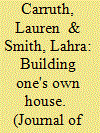

|
|
|
|
|
| Summary/Abstract |
This study uses ethnography along Ethiopian women's irregular migration routes through Djibouti to analyse the complex reasons women leave home to seek labour opportunities in the Gulf States. Theories and policies that either narrowly depict women's motivations as economic in nature or focus only on women's needs for security and protection, fail to account both for the politics of seeking employment abroad, and the ways migration provides women a potential refuge from various forms of violence at home. Using a feminist analysis, we argue that women do not migrate only for financial opportunities, but also to escape combinations of domestic, political and structural violence. As such, irregular migration both evinces a failure of asylum systems and humanitarian organisations to protect Ethiopians, and a failure of the state to provide Ethiopian women meaningful citizenship. Lacking both protection and meaningful citizenship, international migration represents women's journeys for opportunity and emancipation.
|
|
|
|
|
|
|
|
|
|
|
|
|
|
|
|
| 3 |
ID:
186076
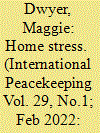

|
|
|
|
|
| Summary/Abstract |
Through the case of the Sierra Leonean deployment on the African Union Mission in Somalia (AMISOM), this study argues that family-related stress is an often-overlooked challenge in peacekeeping deployments. Using in-depth interviews with Sierra Leonean soldiers who were part of the deployment, military decision makers, and foreign advisors, this article lays out specific factors that created family-related tensions and contributed to lowered morale for Sierra Leonean peacekeepers. It demonstrates that the family-related stress on deployment is not only an issue of family separation, it is entangled with the historic trajectories of the armed forces and the sending country’s socio-economic conditions. The focus on Sierra Leone highlights the additional and unique burdens that soldiers and their families may endure in troop contributions from lower-income countries.
|
|
|
|
|
|
|
|
|
|
|
|
|
|
|
|
| 4 |
ID:
181153
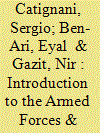

|
|
|
|
|
| Summary/Abstract |
This Armed Forces & Society forum is dedicated to exploring recent trends in the characteristics of military reserves and of the changing character of reserve forces within the armed forces within the military, the civilian sphere, and in between them. To bring new and critical perspectives to the study of reserve forces and civil–military relations, this introduction and the five articles that follow draw on two organizing conceptual models: The first portrays reservists as transmigrants and focuses on the plural membership of reservists in the military and in civilian society and the “travel” between them. The second model focuses on the multiple formal and informal compacts (contracts, agreements, or pacts) between reservists and the military.
|
|
|
|
|
|
|
|
|
|
|
|
|
|
|
|
| 5 |
ID:
091703
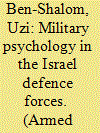

|
|
|
| 6 |
ID:
177669
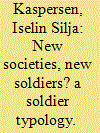

|
|
|
|
|
| Summary/Abstract |
The term ‘soldier’ is frequently conceptualized as a warrior, a peacekeeper, or a hybrid of both. However, recent changes in the utilization of soldiers in societies have moved the repertoire of possible ways to think, act, and behave beyond these notions. As such, there exists an undertheorized gap between different expectations of soldiers and actual soldier roles. This presents a need for more nuanced and analytically useful conceptualizations of soldier roles. This article provides a more thorough understanding of the soldier role by identifying seven ideal types of soldiers: the warrior, nation-defender, law-enforcer, humanitarian, state-builder, and the ideological, and contractor soldiers. The typology offers an analytical tool with the capacity to maneuver the empirical reality, which is important because how soldier roles are constructed affect how military personnel understand their role in the postmodern world, where identity is multifaceted and negotiable. Ultimately, identity influences how soldiers interact with societies and how societies respond to war, conflicts, and crises.
|
|
|
|
|
|
|
|
|
|
|
|
|
|
|
|
| 7 |
ID:
142260
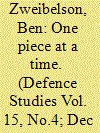

|
|
|
|
|
| Summary/Abstract |
The recent strategic failures in Iraq and Afghanistan for military coalitions illustrate that we have significant problems with understanding how and why we plan military campaigns in ways that over time demonstrate ineffectiveness and confusion. Arguably, we may not realize why we construct insufficient campaign plans because we are not even aware of our cognitive behaviors. This article critically charges that our entire approach to understanding conflict and our subsequent military planning methodologies stem from highly limited yet deeply cherished conceptual models that operate behind the scenes. We hardly realize them, yet they dominate our very understanding of how we imagine the world functions. With military campaign plans, our centralized hierarchies, linear causality reasoning, and other significant sociological forces send us into cycles of poor planning along with institutional blinders that resist critical reflection on why we are failing.
|
|
|
|
|
|
|
|
|
|
|
|
|
|
|
|
| 8 |
ID:
170283
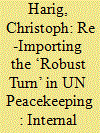

|
|
|
|
|
| Summary/Abstract |
Brazil has been the largest troop contributor and provided all force commanders to the UN Stabilisation Mission in Haiti (MINUSTAH, 2004–2017). As the military embraced a leading role in UN peacekeeping’s turn towards peace-enforcement, Brazil’s governments have increasingly relied on soldiers in public security – occasionally even portraying these operations as a sort of ‘peacekeeping at home’. Yet how has Brazil’s participation in MINUSTAH affected internal military operations? I argue that narratives of the military’s effectiveness in Haiti have been used to legitimise the growing scope of internal public security missions. Drawing on data from a questionnaire-based survey, interviews and focus groups with soldiers and officers, this paper argues that the experience in Haiti has fuelled troops’ demands for rules of engagement that resemble those in UN peacekeeping. Given the armed forces’ increasing bargaining power in Brazil’s politics, the military leadership has been able to successfully lobby in favour of changing parts of the legal framework for internal operations. Lessons from the ‘robust turn’ have been used to promote more coercive internal missions of Brazil’s armed forces. Yet it is impossible to fully reconcile the content of the military’s demands with the rule of law in a democracy.
|
|
|
|
|
|
|
|
|
|
|
|
|
|
|
|
| 9 |
ID:
005468


|
|
|
|
|
| Publication |
Jaipur, Rawat Publications, 1994.
|
| Description |
v, 204p.
|
| Standard Number |
8170332641
|
|
|
|
|
|
|
|
|
|
|
|
Copies: C:1/I:0,R:0,Q:0
Circulation
| Accession# | Call# | Current Location | Status | Policy | Location |
| 036764 | 306.27/PAR 036764 | Main | On Shelf | General | |
|
|
|
|
| 10 |
ID:
083736
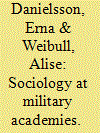

|
|
|
|
|
| Publication |
2008.
|
| Summary/Abstract |
This article illustrates the role of sociology at the Swedish military academies. Finding a suitable balance between theoretical and practical education seems to have been a major thread in Swedish officer education from the eighteenth century to the present day. The emphasis has been on education that is closely linked to military war positions, with extensive elements of combat planning and carrying out military operations. But as tasks have changed, areas such as leadership and organizations have become more important, and the positions of sociological theories and perspective have gradually increased. The belief put forward here is that the demand for sociology will increase for two reasons: the current struggle to make Swedish officer education more university-like and, more important, the need for sociological knowledge that will grow the more the Defense Forces will be engaged in the international arena.
|
|
|
|
|
|
|
|
|
|
|
|
|
|
|
|
| 11 |
ID:
083734
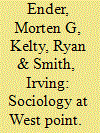

|
|
|
|
|
| Publication |
2008.
|
| Summary/Abstract |
Sociology and the Sociology Program at the United States Military Academy at West Point, New York, are described. Grounded in the academy's mission of educating and inspiring future leaders of character, this article focuses on the history of the Sociology Program, alignment with American Sociological Association standards, sociodemographics of cadet sociology majors, recent graduates, the curriculum, extracurricular activities, and the sociology faculty and their productivity. The Sociology Program has made significant progress in multiple areas while concomitantly being handicapped in other areas. The conclusion addresses the significance of social science in military officer education
|
|
|
|
|
|
|
|
|
|
|
|
|
|
|
|
| 12 |
ID:
083731
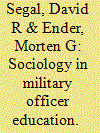

|
|
|
|
|
| Publication |
2008.
|
| Summary/Abstract |
This essay introduces a special issue of Armed Forces & Society examining sociology at military academies around the globe. Articles represent nine countries-Canada, France, Japan, the Netherlands, Russia, South Africa, Sweden, Turkey, the United States. We begin with a brief history of sociology and the military and growth of military sociology as a subfield, followed by the development of military academies in general and sociology at military academies more specifically. The essay concludes with six trends found across the nine nations and ten academies-the stigma of sociology; the cannibalization of sociology courses; co-optation of sociological concepts; charismatic leadership; radical social change; and revitalization.
|
|
|
|
|
|
|
|
|
|
|
|
|
|
|
|
| 13 |
ID:
083733
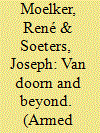

|
|
|
|
|
| Publication |
2008.
|
| Summary/Abstract |
In the 1960s, Jacques van Doorn started teaching (military) sociology as a formal, scientific discipline at the Netherlands Military Academy. Since then, the way military sociology was taught at the academy has seen a great number of developments; the philosophy of education at the academy changed into an interdisciplinary and problem-based learning approach. These changes evolved into military sociology becoming a recognized perspective for analyzing military operations while being valued for its contribution to the functioning of future officers. With this shift, military sociology has developed a more pragmatic character. Even though theoretical development has sometimes been hampered by this preoccupation with pragmatics, in most times the blending of theory and praxis has stimulated the development in this field of knowledge
|
|
|
|
|
|
|
|
|
|
|
|
|
|
|
|
|
|
|
|
|